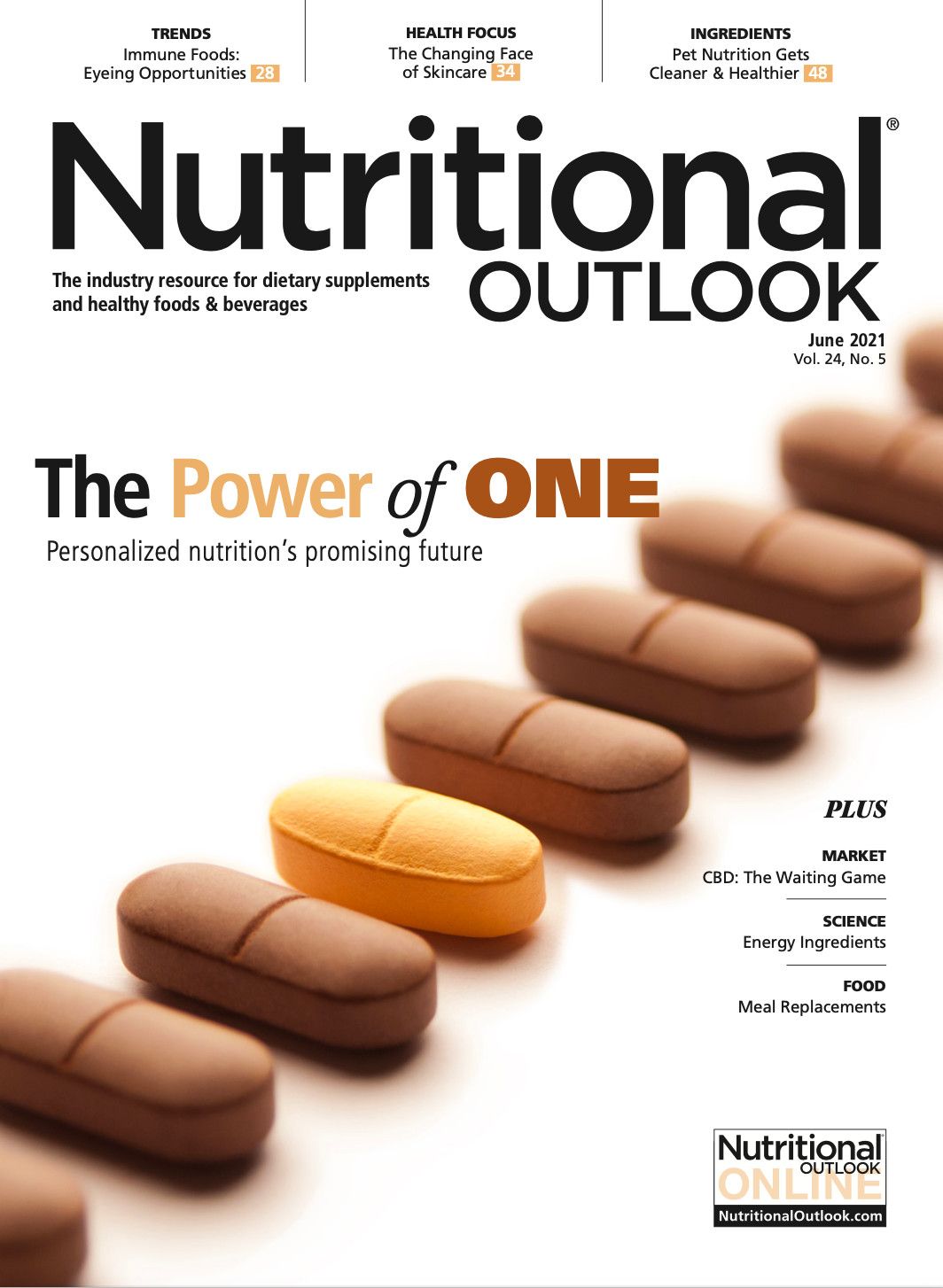The personalized nutrition market isn’t one-size-fits-all
Companies are taking individualized approaches to succeed in this fast-growing market.
Photo © AdobeStock.com/Jose Luis Stephens

From a marketing perspective, personalized nutrition has been around for some time. Back in the 1970s, Burger King launched its highly successful “Have It Your Way” campaign, encouraging consumers to choose the condiments and toppings they wanted to add or displace from their burgers. Even further back, in the early 1960s, a bread company, Levy’s, created its “You Don’t Have to Be Jewish to Love Levy’s” campaign to entice a diverse population of potential customers to see themselves among those enamored with Levy’s rye bread. It’s possible that personalized nutrition marketing goes back even further, but today, as modern technology provides more ways to capture data and people’s interest, personalized nutrition marketing is even more relevant.
But while marketing plays a vital role in personalized nutrition, it’s the element of health combined with technology that is taking center stage.
The American Nutrition Association published a paper in January 2020 in the Journal of the American College of Nutrition that proposed a definition of personalized nutrition as a “field that leverages human individuality to drive nutrition strategies that prevent, manage, and treat disease and optimize health.”1
With roots in nutrigenomics and nutrigenetics, the field of personalized nutrition is still considered to be in its infancy—with the potential for growth enormous.
Creating Opportunities for Business Growth
Thomas Hayes, an analyst at Lux Research, a leading provider of tech-enabled research and advisory services, says, “There’s no definitive start date to when the personalized nutrition market started, but in 2016 when Campbell’s invested $32 million into [personalized nutrition company] Habit, that was certainly the tipping point. Since then, there has been a flurry of investments, partnerships, and acquisitions in the personalized nutrition space—some more successful than others.”
According to Nutrition Business Journal, the personalized supplement market is expected to grow from an estimated $281 million in 2019 sales to a forecasted $4.3 billion in 2023, representing 6.4% of U.S. supplement sales by the end of that period.2
That’s a nice-sized bump from the less than 2% of the supplement market that both Jason Brown, founder and CEO of Persona Nutrition (a Nestlé Health Science company), and James Bauly, head of personalized nutrition at DSM Human Nutrition & Health (Switzerland), say the personalized nutrition market currently claims.
“Personalized nutrition is a relatively young but hugely exciting area when it comes to the development of more tailored and holistic solutions” advises Bauly. “We’ve seen from our own experience in the market that there’s a lot of interest and building momentum in this emerging space. There is significant market potential as well. A recent analyst report estimated it could be worth as much as $64 billion globally by 2040.”3
Persona’s Brown believes “there is so much opportunity for growth and innovation that I truly love being in this industry.” Brown built and sold companies all his life, he says, creating Vitamin Packs (now known as Persona Nutrition) in 2016, and selling it to Nestlé Health Science in 2019. “I’m seeing opportunities for personalized nutrition to evolve to include not only vitamins and supplements but meal programs to support various diets”—something he says the company is developing now.
As Brad Helfand, chief operating officer, Vous Vitamin, puts it, “We are in the proverbial first inning in the movement into personalized nutrition.”
Because of that enormous potential, the competition is fierce, with companies looking to differentiate themselves not only from each other, but to steal share from more traditional vitamin companies.
Not surprisingly, there are niches within the personalized nutrition category. Nutrition Business Journal said in its report2 that “companies are providing customized supplement options through a variety of testing, including health and lifestyle surveys, genetic testing, microbiome testing, and other biomarker tests.”
The one common denominator from those in the market—which includes entrepreneurial and legacy companies—is the acknowledged goal of offering products and platforms that make people healthier through tailored solutions.
What’s the Draw of Personalized Nutrition?
Many who work in the dietary supplement industry can attest they’re peppered with questions at dinner parties, or cocktail parties, or just in conversations with strangers, once the others discover your day job.
Imagine how it must be for doctors.
“What should I be taking?” “What do you think about this product?” “Are supplements really safe?” It was questions like these from patients, friends, acquaintances, and those who unexpectedly fell upon the ear of a doctor at a social event that served as impetus for two colleagues and friends, Romy Block, MD, and Arielle Levitan, MD, to create their own personalized nutrition company, Vous Vitamin, in 2014.
Before Vous Vitamin was born, finding solutions to these questions, according to Block, an endocrinologist, was challenging. First, she recognized the muddling of daily news stories conflicting with previous days’ daily news stories, causing consumers confusion about what supplements they really needed. Then, she advises, she and Levitan, an internist/primary care physician, had a really hard time recommending the vitamin products that were already on the market, leading them to “come up with our company and our own manufacturing and our own formulations.”
In 2015, the Vous Vitamin co-founders followed up with their book, The Vitamin Solution: Two Doctors Clear the Confusion about Vitamins and Your Health. It appeared they were on to something. “When we were touring with our book,” says Block, “we felt like rock stars. The book talk would be over, and people would follow us to our car, asking us questions about vitamins.”
Their company model is very specific. For consumers, it starts with an online quiz that allows the company to better understand the potential customer’s nutritional habits. The company says it then uses proprietary data sets and data science to drive product innovation and deliver value for the consumer. “We have certainly seen different companies take various paths to personalization,” advises Block. “Our approach is built around simplicity and sustainability. We deliver our solution in customized, all-in-one multivitamin tablets that are easy to swallow, decrease the pill burden, and remain affordable to the consumer.”
E-mail relationships with customers is an important communication tool for Vous Vitamin. With a large content depository ranging from blogs to other educational material, Helfand says the company’s “physician-authored information on vitamins is the kind of data that we deliver back to our consumers so they can understand what their vitamin is doing for them.”
Block is quick to point out that the company isn’t dispensing medical advice; rather it’s using its algorithm to fine-tune things for the customer. So, while the questions in the online survey are not “a hundred percent specific, they’re tailored enough to allow us to direct you to the correct multivitamin,” a formula that can include not only the essential vitamins but also ingredients such as probiotics and curcumin, with an add-on pill of algal omega-3s, for example, as needed. Vous Vitamin recommends the customer share the recommendations with her or his primary care physician or other practitioner, with Helfand calling the relationship between patient and provider “pretty sacrosanct.”
Helfand adds that Vous Vitamin is “very much of the belief that a multivitamin can be effective if you are really thoughtful in how you curate the nutrients for that individual and if you align the dosing with the leading critical evidence out there [as to] when a nutrient will make an impact on you.”
Persona also starts with an online assessment, which according to the company’s website allows the firm to create “custom supplement plans…designed with expertise from our Medical Advisory Board, a team of doctors and leading health experts who analyze the latest research to ensure your nutrition assessment and recommendations are grounded in cutting-edge science.” It also offers one-on-one consulting from qualified nutritionists at no additional charge.
Persona’s personalized nutrition solutions come in the form of customized pill packs, pulled from a wide range of supplements focused on supporting a number of specific concerns, such as mood, sleep, stress, bone health, and more.
One piece of the Persona philosophy grew from a finding in a national survey. Brown explains that the survey “found that 67% of Americans don’t realize that vitamins and prescription medications can interfere with one another, potentially with unwanted side effects.” Because of that concern, as part of its online nutritional assessment, Persona asks about prescription medicine use. Brown shares that Persona has “two pharmacists on staff who are continuing to build our drug-nutrient side-effect database, and we are proud to be able to cross-reference more than 3,000 prescription medications before we recommend vitamins and supplements.”
And, he adds, “Our marketing team continues to raise awareness of drug-nutrient interactions and possible side effects to help inform adults who are taking supplements alongside their medications. They can both live in harmony, but people need to be informed by either their physician, community pharmacist, or their vitamin partner.”
DSM Human Nutrition & Health has a strong reputation in the nutritional space. Over the last few years, the company has completed a range of investments and acquisitions—including AVA, a digital platform for nutrition and coaching recommendations—to strengthen its personalized nutrition offering.4
Says DSM’s Bauly, “We are now in a position to offer solutions across the entire personalized nutrition value chain, from concept to consumer. Our expertise in nutrition science, combined with our broad portfolio of capabilities, allows us to be a true, end-to-end partner for our customers.”
The company is committed to personalized nutrition. Bauly explains, “Our newly launched brand strategy puts purpose at the heart of everything we do in the health and nutrition market, with the ultimate aim of keeping the world’s growing population healthy. Key to this is connecting with the consumer behind the products and understanding how we can support our customers in delivering real-life benefits to that individual. By deploying emerging non-invasive diagnostic technologies, for example, we can support in monitoring and accessing end-user information better and more easily.”
DSM sees its longstanding position in the nutritional ingredients market as an added benefit. According to Bauly, “We can today provide brand owners with all the tools they need to create effective personalized nutrition recommendations and products that meet consumer preferences and health needs. This includes the development of market-ready solutions that can be adopted by brand owners and quickly taken to market.”
Another Approach to Personalized Nutrition
Hayes, of Lux Research, comments: “In 2016”—when Campbell’s joined the personalized nutrition space—“much of the personalized nutrition offerings really weren’t all that personalized, catering to the general health-conscious consumer. While that still holds true to an extent today, the space has evolved to become more focused on specific use cases with stronger value propositions—diabetes management, for example. I envision this progression to continue, especially towards prevention and management of diet-related diseases and conditions.”
One company that is intrigued about personalized nutrition is also concerned that the industry not put the cart before the horse.
Eremid Research Services (Kannapolis, NC) is a contract research organization with over 10 years of specialized expertise in sectors including human health and food and nutrition. Nicholas D. Gillitt, PhD, chief scientific officer at Eremid, says, “The idea that we can personalize dietary advice, thereby making it more effective based on our health profile, metabolic status, or DNA readouts, could be immensely beneficial to general health and particularly disease avoidance and therefore longevity.”
He believes that to measure these types of personalized profiles, you need sophisticated scientific research equipment capable of producing the outcome measures that can tell you if metabolic status is suboptimal, or if your genetic profile is suggestive of a particular dietary intervention or avoidance.
He would also like to see sophisticated technology play a growing role in future research, in part to help inform the body of scientific evidence but also to help pinpoint more specific recommendations for individuals. “The technology that supports these platforms has never been more powerful. The mass spectrometers used in metabolomics and proteomics are incredibly fast and sensitive. Sequencing platforms can now produce incredibly large data sets and plough through very large sample numbers,” states Gillitt. “Now is the time to really apply all this technology to personalized nutrition and perform the kind of research studies that will tell us what we should eat and why.”
Eremid engages in a “multi-omics” approach when it comes to research. Gillitt explains that this approach “is one where you look at multiple sets of data from different platforms—as opposed to looking at a single dataset from one platform—to gain a deeper biological understanding of what you’re looking at.”
He adds, “Personalized nutrition is very complex, even though it is based on a simple progression (gene-protein-metabolite). The reality is that to get a true picture of what is happening in your metabolism and the effects diet and exercise can have on it, we are increasingly needing to look at more than one particular type of dataset. This is why multi-omics technologies are feeding how companies now look at personalized nutrition.”
Gillitt sees all this as the gold standard in the not-too-distant future for personalized nutrition. “Pretty soon,” he says, “we will be able to take a simple sample, maybe a blood drop on a card or something similar that you mail into a provider. They will take a look at your genomic, proteomic, and/or metabolomic profiles and—this is key—you will do this monthly so they can monitor it over time.”
The results might be reported to you by phone or some other device, he suggests. If you are outside the parameters of healthy weight or blood pressure, as examples, your device will send you a warning and offer personalized advice on what you need to change to get you back in the healthy zone.
Gillitt recommends that companies in the personalized nutrition space shift focus from marketing to science in order to truly prove the efficacy of their products, especially in the area of micronutrient (vitamins and minerals) supplements. He advises, “The technologies that we have discussed can do this. Invest more in science and product development to prove efficacy—i.e., test whether these products can actually make a difference to your health status.”
He adds, “In the modern, fast-paced society we live in, convenience is everything. But if you’re going to ask the public to spend their hard-earned cash on your health product, make sure it works and leave the dubious marketing behind.”
Consumers Get More Comfortable With Personalized Nutrition Concepts
According to market researcher Euromonitor International’s global Health and Nutrition consumer survey in 2020, just over 46% of consumers would be “extremely comfortable” (19.5%) or “very comfortable” (26.8%) using personalized nutrition online and app-based services.5
This squares with Vous Vitamin's experience. Says Helfand, “When we started this company [in 2014], many consumers were wary about even entering their credit card or making an online purchase. There has been an explosion of interest in e-commerce and direct-to-consumer subscription business, and in the current moment, consumers are extremely comfortable with our model—and it resonates with other purchases they make online.”
DSM points to findings from a recent FMCG Gurus survey of 32,000 consumers globally, which Bauly advises found that two-thirds of respondents are interested in customized food and drink products that address individual nutritional needs. In North America specifically, the study shows that 59% of consumers are paying more attention than ever to these type of solutions, with 21% of people actively seeking them out.6
While DSM’s efforts in this space began in the supplement arena, according to Bauly they are also working on food and beverage solutions to “deliver wider, holistic health solutions.”
Shifting the Paradigm
“I see personalized nutrition as a disruptor,” says Brown. “It’s creating new opportunities at retail and within the direct-to-consumer channel as well as ways companies can interact with their customers. From the start of an online quiz or a finger prick to capture a nutrient profile, the company can learn so much about its customers and really take customer care to an entirely new level.”
Helfand finds the potential to wrap data-based relationships with consumers around their daily vitamin routine “revolutionary,” explaining that purchasing a bottle at retail is very transactional. “But a direct data-base relationship with the consumer,” he says, “actually allows us to take them on a longitudinal journey around their vitamin use. That adds a lot of promise for the industry.”
Hayes agrees. “Personalized nutrition is a space that holds a lot of promise.” However, he adds that this promise comes with some strong caveats. “Where we have seen certain high-profile personalized nutrition companies fail was not due to a major deficiency in technological capability or funding. It all came down to business execution, or lack thereof.”
In a new Lux Research report titled “Finding Business Success in Personalized Nutrition,” lead author Hayes offers a modification to the well-established “4Ps of Marketing Framework” to his company’s recommended “4Ps of Personalized Nutrition.” This constructs a winning strategy based on price, product, people, and partnerships to provide a lasting value proposition, he advises.7 “Striking a balance and addressing each of the ‘4Ps of Personalized Nutrition’ is what will make personalized nutrition become widespread,” Hayes says.
Hayes views the number-one driver for personalized nutrition to unequivocally be the need to shift the healthcare paradigm. He says, “We live in a world with well over a billion people afflicted with diet-related diseases and conditions, and to add insult to injury, the cost of care is increasing. For diabetes alone, in 2015 researchers estimated the global economic burden from the disease was $1.3 trillion per year and projected that figure to nearly double by 2030.8 This is creating a long overdue impetus to reverse the healthcare system from being reactive to proactive, signaling a massive opportunity for nutritional intervention through foods, beverages, and supplements—all at a personalized level.”
And above all, a personalized nutrition solution must be affordable, easy-to-integrate, and actionable for each and every user, according to Hayes. “These are key elements for a personalized nutrition solution to realize success in the marketplace, which is certainly much easier said than done, especially when affordability is at odds with holistic and accurate ways of measuring health,” he says.
Given that the word personalization is paramount to this relatively new category of nutrition, it makes perfect sense that companies will take individual approaches to their offerings. Having a variety of choices may best serve the market by best serving consumers, allowing them to individually select what model they prefer for their own needs.
After all, as DSM’s Bauly says, “By its very nature, a one-size-fits-all approach is not suitable for personalized nutrition.”
References
- Bush CL et al. “Toward the definition of personalized nutrition: a proposal by the American Nutrition Association.” Journal of the American College of Nutrition, vol. 39, issue 1 (January 2020): 5-15
- Nutrition Business Journal report. “Personalized Nutrition Special Report 2020.” Accessed here.
- Fitzgerald M. “Personalized Nutrition Could Be the Next Plant-Based Meat, Worth $64 Billion by 2040, Says UBS.” CNBC. Published January 19, 2020. Accessed here.
- Press release. “DSM Acquires AVA and Further Strengthens Its Position in Personalized Nutrition.” Published November 19, 2019. Accessed here.
- Euromonitor International Health and Nutrition Survey 2020. Fielded in February 2020.
- FMCG Gurus report. “The Growth of Personalized Nutrition in 2020.” Published July 2020. Accessed here.
- Executive summary. “Finding Business Success in Personalized Nutrition.” Lux Research. Issued August 2020. Accessed here.
- Bommer C et al. “Global economic burden of diabetes in adults: projections from 2015 to 2030.” Diabetes Care, vol. 41, no. 5 (May 2018): 963-970

Prinova acquires Aplinova to further increase its footprint in Latin America
April 7th 2025Prinova has recently announced the acquisition of Brazilian ingredients distributor Aplinova, which is a provider of specialty ingredients for a range of market segments that include food, beverage, supplements, and personal care.




















